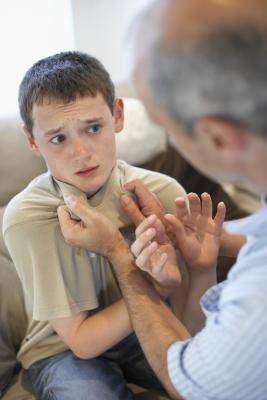Violence among some children has become so prevalent that their parents are actually afraid that they will be attacked or killed by their own children. Violent kids can also hit their siblings, break things around the house and torture animals. Once you understand the reasons your child is violent, you can help him stop. Learning why children become violent also allows you to prevent your child from becoming violent.
Children Learn Violence
Children are not born violent; they learn how to become violent. Because they learn violence, they can unlearn it. Children become violent for different reasons, but certain factors are more likely to cause a child to be violent than others, such as poverty, watching violence on TV and being around adults who don’t really like or trust young people. For example, a kid who suffers neglect or abuse from his parents is more likely to become violent. Exposing your child to arguments you have with your partner can also contribute to your child becoming violent.
Bad Environment
A child who grows up in a neighborhood with gangs, drugs and weapons is more likely to become violent. If your child’s peer group is violent, your child is more likely to behave that way, too. A child who attends a school that does not offer a quality education, does poorly in school or lives in a community that has no recreational outlets may become violent.
Television
A constant diet of violent TV can make a child more violent. Young children don’t understand the difference between reality and fantasy, so when they watch fake violence on TV, they might try to emulate it. In fact, on TV, sometimes the good guys are violent to get what they want, which encourages imitation. Also, the more violence kids watch, the more desensitized they can become.
Kids Who Aren’t Violent
Kids who aren’t violent are around adults, both family members and non-family members, who value them and who enjoy working and spending time with them. Parents who are consistent in enforcing behavioral rules and discipline raise children who are less likely to become violent. Kids need a sense of purpose and a belief that they will have a positive future. They need to understand that education is the key to success. They also need to have some independence, control and a sense of caring for others in their lives.
Six Core Strengths
In an article on the Scholastic website, Dr. Bruce D. Perry, who leads ChildTrauma Academy, wrote that while no one knows the exact reason why any particular child is violent, if a child has the six core strengths of attachment, self-regulation, affiliation, awareness, tolerance and respect, he rarely becomes violent. If any of the core strengths is missing, however, a child is more prone to becoming violent.
Six Core Strengths Explained
Attachment refers to your child’s having a friend, which is the building block of the other core strengths. If your child cannot make friends, she is more likely to act out or withdraw, which puts her at a greater risk for violence. If a child cannot self-regulate, she will have a more difficult time making friends. For example, she may blurt out an inappropriate remark or push another child, which typically won’t gain her friends. If a child cannot affiliate with a group, she isolates herself even more. The pain of the exclusion may make her hate herself or hate others. A child who is not aware of other people’s needs can become prejudiced and think, for example, that someone who speaks with an accent must be stupid. A child who lacks tolerance for others tends to lash out or bully them. A child who doesn’t respect others may not respect herself. If she hates something about herself, she may ridicule others who have that trait. Perry says that the lack of respect for oneself and others is the core of all violence.





